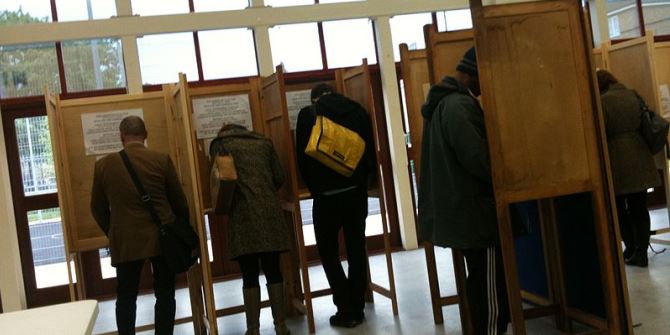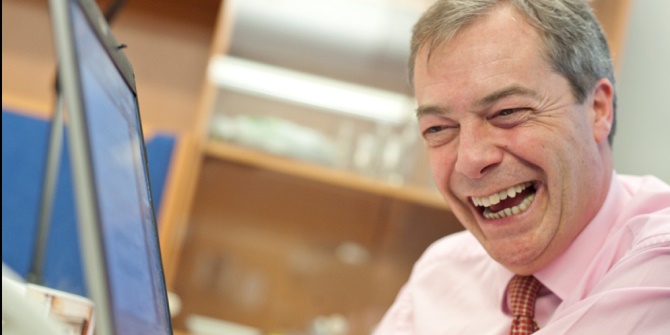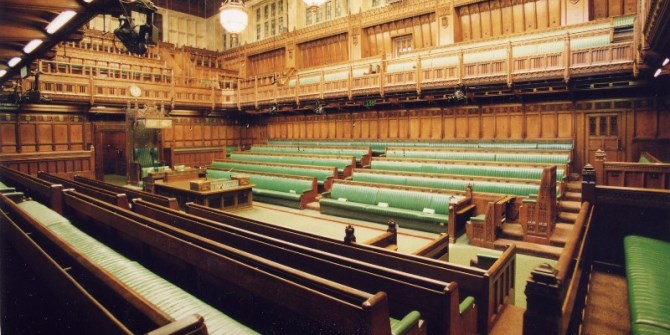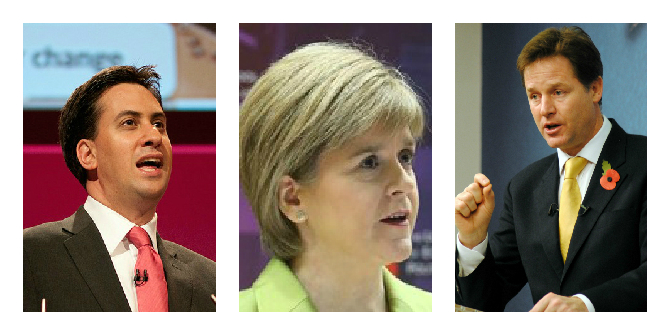 Democracy is about far more than a vote, writes Matt Flinders. It is about everyday life, it is about community engagement, it is about personal confidence and belief, it is about daring to stand up and be counted and its about the art of life and living together in the twenty-first century. Democratic politics has become a toxic brand and it needs to re-brand itself by offering a new and fresh account of both the challenges and opportunities that undoubtedly lay ahead.
Democracy is about far more than a vote, writes Matt Flinders. It is about everyday life, it is about community engagement, it is about personal confidence and belief, it is about daring to stand up and be counted and its about the art of life and living together in the twenty-first century. Democratic politics has become a toxic brand and it needs to re-brand itself by offering a new and fresh account of both the challenges and opportunities that undoubtedly lay ahead.
With a general election rapidly approaching in the UK, it’s easy to get locked into a set of perennial debates concerning electoral registration, voter turnout and candidate selection. In the contemporary climate these are clearly important issues given the shift to individual voter registration, evidence of high levels of electoral disengagement and the general decline in party memberships (a trend bucked by UKIP, the Greens, and the Scottish National Party in recent months).
My concern, however, is that democracy has to be about far more than a vote. It’s not just about elections; it’s certainly not just about political parties and the risk of the 2015 general election is that without being embedded within a range of more creative and engaging forms of political participation it’s just . . . another election.
Politics therefore has an important challenge in terms of ‘brand management’. Not of the vacuous form of ‘Russell Brand Management’ but of the challenge of re-imaging, redefining and re-connecting with a public that has (and is) changing rapidly; a mass social frenzy around the general election risks creating a situation of boom-and-bust in terms of the public’s expectations and the subsequent results in terms of governmental performance in an increasingly complex world.
I can’t help wondering if democratic politics even has the capacity anymore to produce those social highs of yesteryear — the ‘Obama effect’ or ‘Blair effect’ — where there was a real sense that positive reform was both possible and on the horizon. Could it be that democratic boom-and-bust (a largely inevitable element of democratic life) has been replaced by the dull thud of bust-and-bust politics?
The general election risks becoming part of the traditional life-cyle of politics that seems to be turning an increasingly large slice of the public away from ‘conventional’ politics. But, then again, does UKIP in the UK — or Podemos in Spain, the Five Star Movement in Italy, the National Front in France, or Syriza in Greece — really offer a rejuvenated model of democracy or (and this is the critical point) simply a thinner and more dangerous form of exclusionary politics? Is the boom-and-bust of populism not potentially louder and more destructive? In many ways the populist parties are a legitimate ‘challenger brand’ but they offer democracy a potentially dangerous dilemma.
In an excellent recent essay on democratic discontent Claudia Chwalisz highlighted that two decades have passed since Arend Lijphart famously identified unequal participation as ‘democracy’s unresolved dilemma’ and this dilemma has intensified rather than diminished in the intervening years. Why? Because the correlation between voting and policymaking has eroded to the extent that the public now question whether voting actually matters. To some extent this is an issue of perception as much as reality — a perception reinforced by the ‘Russell’ approach to Brand Management. It is also, to some extent, an inevitable element of democratic politics that as the demands of the populous become more complex and varied then the compromise-orientated element of that worldly art called politics will reflect this fact and become increasingly opaque. But there is something else going on — the insulation of a dominant economic elite that appears almost insulated from democratic control or scrutiny. Votes don’t seem to affect the cosmopolitan business elite and, as a result, capital in the twenty-first century is eroding democratic politics.
My message? Don’t expect too much from the 2015 general election for the simple reason that democracy is about far more than a vote. It is about everyday life, it is about community engagement, it is about personal confidence and belief, it is about daring to stand up and be counted and its about the art of life and living together in the twenty-first century. The problem is that democratic politics has become a toxic brand and it needs to re-brand itself by offering a new and fresh account of both the challenges and opportunities that undoubtedly lay ahead. That is a model of democracy that is deeper and richer, creative and honest, formal and informal, amateur and professional, agile and responsive, as responsibility-based as rights-based and as innovative as it is international. The problem is that at the moment ‘democracy’ appears almost synonymous with ‘elections’ and this robs it of its potential.
Democracy is about more than a vote.
Note: This article was originally published on the OUP blog and gives the views of the author, and not the position of the British Politics and Policy blog, nor of the London School of Economics. Please read our comments policy before posting. Featured image credit: Alex Lee CC BY 2.0
 Matthew Flinders is Director of the Sir Bernard Crick Centre for the Public Understanding of Politics at the University of Sheffield. He is also Chair of the Political Studies Association of the United Kingdom and is Visiting Distinguished Professor of Governance and Public Policy at Murdoch University in Western Australia. The Crick Centre has launched a programme of events and resources around the theme of ‘more than a vote’ as an antidote and corrective to the democratic stress of the 2015 General Election. Follow along with the conversation on Twitter with #morethanavote.
Matthew Flinders is Director of the Sir Bernard Crick Centre for the Public Understanding of Politics at the University of Sheffield. He is also Chair of the Political Studies Association of the United Kingdom and is Visiting Distinguished Professor of Governance and Public Policy at Murdoch University in Western Australia. The Crick Centre has launched a programme of events and resources around the theme of ‘more than a vote’ as an antidote and corrective to the democratic stress of the 2015 General Election. Follow along with the conversation on Twitter with #morethanavote.









Democracy is about far more than a vote but unless we get the voting systems right, at both local and national level, democracy cannot flourish.
If democracy is about personal and community engagement we need to revive politics at the local level. That means relinquishing real power, for good or ill, from the centre and allowing local politicians, on occasions, to mess up.
Obviously bad decisions that spark local campaigns might just revive our democracy.
Stephen,
Do you also agree that the political system – party funding, MPs having a Legal or Statutory obligation to ‘represent’ and it being measured for achievements – is a fundamental basis for a democracy?
Additionally, do you feel the Parliamentary Ombudsman having a remit to investigate claims from constituents with regards to MPs is also a measure that scrutinises ‘performance’ of MPs – using the same measures that politicians took to ensure teachers, NHS… etc are measured for performance and targets?
Without this fundamental benchmark to represent a democracy, how on earth can MPs justify their wages – not least a raise to £100,000.00??
I agree Party funding needs change.
Whether or not MPs are satisfactory representatives for their constituents should only be a matter for the constituents when they vote at the next election. They can vote in a new MP if they are not satisfied with the one they elected last time.
This means we need a new voting system, one that does not conflate the vote for the MP with the vote for the party, so that the electorate can choose the best person to be the MP and still vote for the party of their choice to elect the government.
I am not a great fan of performance measurement for teachers or the NHS because usually the parameters you can measure are not the key issues, and measurement of them has impacts on performance which are not always predictable and often unintended.
It will be unsatisfactory if we only sort out MPs salaries without doing something about salaries for employees both in the public sector and in the private sector. Excessive private sector pay is the result of poorly functioning markets which, I believe, could be sorted out by payroll taxes on companies that pay excessively high salaries.
Having said that, MPs are not paid enough. They should be paid more, but they should not have any secondary paid employment.
Stephen,
Thank you for your response to my comments.
On the point I raised regarding MPs being ‘satisfactory representatives’ – you respond by saying that – quote: “Whether or not MPs are satisfactory representatives for their constituents should only be a matter for the constituents when they vote at the next election. They can vote in a new MP if they are not satisfied with the one they elected last time”. My response to your comment on this particular issue is one of shock – given that ‘failure’ should not be left to grow in our communities.
On reflection, would you not accept that the consequence of leaving disadvantaged, vulnerable or ‘failed’ constituents who seek solutions due to policy failings also highlights the failure of a democratic benchmark we are discussing? Surely, your own support of maintaining this system for MPs in its current form would only continue to detriment people… lives. How one earth can anyone think that a weak system of representation should not be changed, but the new person operating this same system is somehow going to pick-up the pieces of those who such systems have already failed?
Stephen, we have to be more understanding and insightful or what ‘failure’ actually achieves, don’t we? Mental health challenges, those failed and failed again who will become reliant of the state benefit process and, many times, an isolation from the engagement they desperately have always sought. Is that a system that is democratic to you?
Finally, you didn’t respond to the ‘striving to make MPs ‘work’ measured while their achievements on behalf of constituents’ – given their wages.
MPs may well do long hours, but if they are achieving very little, if anything, for constituents – how can their current wages – or prosed increase – ever be viable?
Regards,
Dear Matt,
You raise important points that represent how it is the many strands within our communities – and society overall – that are all fundamental in unifying and enabling a democratic benchmark that is meant to represent ones right to achieve Fairness and justice irrespective of financial and professional status.
Unfortunately, whilst we may well agree in a common language of words expressed to identify the ‘how” and ‘why’ democracy is important, it do feel that it is clear to many that the practical reality of achieving it remains extremely difficult.
Yes, a democratic benchmark has to reflect a FAIR political system…
1. For example, MPs don’t have any legal or statutory obligation to represent anybody… and many times they don’t. Also, what does political ‘representation’ actually mean? Is it about MPs solving problems for constituents who have been failed by political policies? If so, where is the data that shows how much MPs are achieving for constituents? Yes, a target-based system for MPs – the same system that MPs voted on to secure target-driven achievements in the NHS, teachers…. etc. Surely, if MPs believe it is right for the public sector to have such a system, it should be right for MPs… who are paid £67,000.00 a year for not being accountable in this way – not least for not having a job description!
2. The Powerful news media – journalists and investigative journalism – MUST be applied towards ‘harnessing the voices’ of the same community you refer to.
Many times – even in our 24 hour BBC and Sky news channels – many voices are not harnessed – thus, we never see journalists going into the heart of our communities and giving ‘ordinary’ people an opportunity to respond to stories, but also… to give examples of their own stories with a view of making news! Why is this? Doe such a lack of real stories counteract the same democratic benchmarks or standard you refer to?
Finally, with so many recent news topics that highlight historic ‘Abuse of Power’ stories – mostly from vulnerable people who’s voices were prevented from being harnessed by those in Power – does this not highlight the importance of preventing such an appalling weakness to such democratic standards from happening again?
Finally Matt, do you believe that the democratic benchmarks that you and I refer to still remain a challenge rather than a reality in policy and practice? If you believe a democratic does exist, how many times do we actually see such achievements experienced by ‘ordinary’ folk in our 24 hour news media?